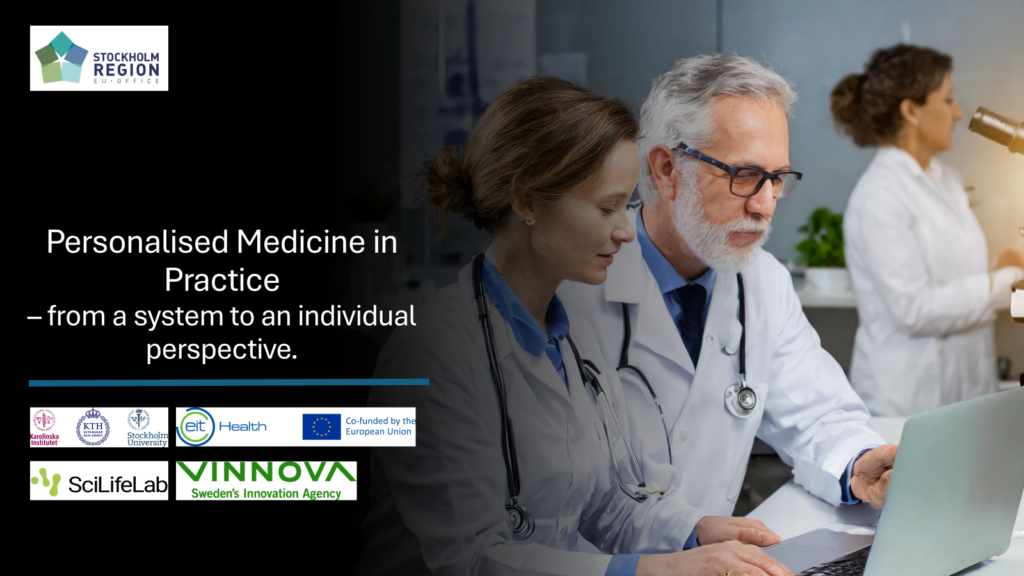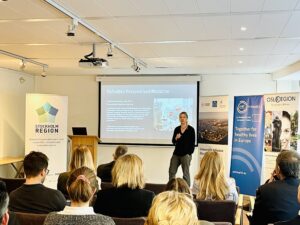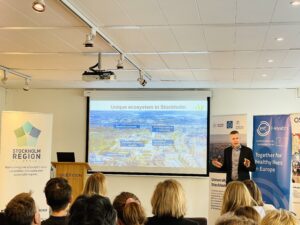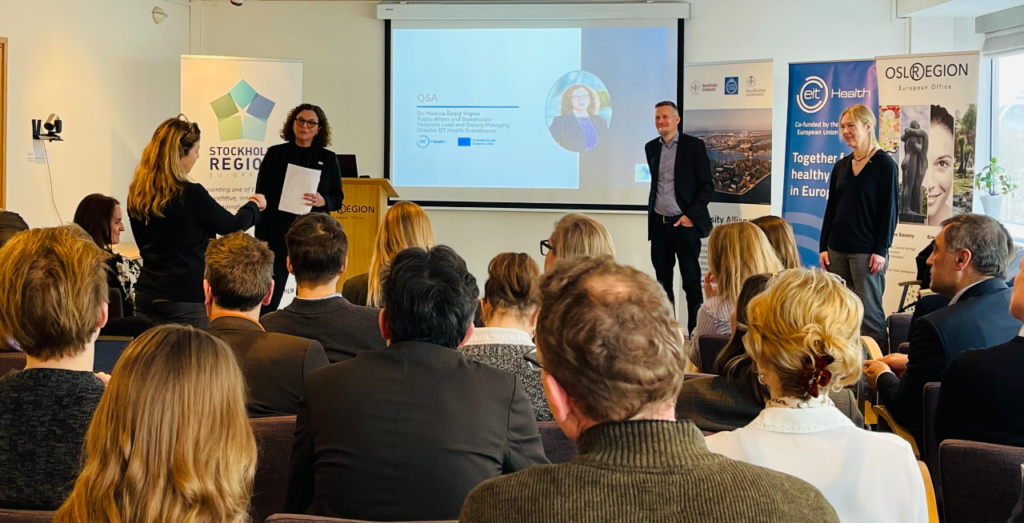
On the 1st of February, Stockholm Region EU Office, in collaboration with the University Alliance Stockholm Trio, EIT Health Scandinavia, Vinnova and Science for Life Laboratory at Karolinska Institute, hosted a breakfast seminar on “Personalised Medicine in Practice – from a system to an individual perspective”. The aim was to discuss how to shape a proactive European healthcare system for the individual person, focusing on personalised medicine, innovations, and the EU’s health data space.
Background
The breakfast seminar on “Personalised Medicine in Practice – from a system to an individual perspective” is the first seminar that Stockholm Region EU Office organised this year. Sweden has recently joined the newly launched European Partnership for Personalised Medicine – EP PerMed, which aims to improve health outcomes within sustainable healthcare systems through research, development, innovation, and implementation of personalised medicine approaches for the benefit of patients, citizens and society. Sweden aims to become world-leading in life science and health care, emphasizing the need for personalised medicine within the EU.
The seminar was hosted in collaboration with the University Alliance Stockholm Trio, an alliance representing three universities from the Swedish capital of Stockholm; the Karolinska Institutet, the Royal Institute of Technology (KTH) and Stockholm University. It was also co-hosted with EIT Health Scandinavia, a knowledge and innovation community of the European Institute of Innovation and Technology (EIT) and aims to build an ecosystem where fresh thinking in healthcare can thrive. EIT Health is joining together a community of innovators dedicated to improving the lives of people and patients.

The invited speakers were Dr. Malin Eklund, Ph.D., Program manager within Sustainable Precision Health at Vinnova, and Prof. Janne Lehtiö, Ph.D. at the Karolinska Institute and Scientific Director at Science for Life Laboratory in Stockholm. The following discussion was moderated by, Dr. Monica Åberg Yngwe, Public Affairs and Stakeholder Relations Lead and Deputy Managing Director at EIT Health Scandinavia.
The seminar
Ms. Anne Andersson, CEO at Stockholm Region EU Office, and Ms. Sanna Sjöblom, Policy Officer at the University Alliance Stockholm Trio, began by welcoming the guest speakers and the audience to the seminar, and also thanking Oslo Region Europe Office for hosting.
 Dr. Malin Eklund, Ph.D., Program manager within Sustainable Precision Health at Vinnova, underlined the importance of moving from reactive and population-based interventions to more preventive and personalised interventions. Approximately 40% of cancer diagnosis are preventable but only a fraction of heath care spending is invested in prevention. In addition, a substantial percentage of the prescribed drugs and treatments do not benefit the patient today.
Dr. Malin Eklund, Ph.D., Program manager within Sustainable Precision Health at Vinnova, underlined the importance of moving from reactive and population-based interventions to more preventive and personalised interventions. Approximately 40% of cancer diagnosis are preventable but only a fraction of heath care spending is invested in prevention. In addition, a substantial percentage of the prescribed drugs and treatments do not benefit the patient today.
There is a need to leverage the technological developments in diagnostics and make better use of health data to choose the right treatment for the right patient. To achieve a system for health that allows the individual to have more years with good quality of life and to maximise the benefits of personalised medicine, Dr. Eklund pointed out the need to work on three levels: 1) Individual, behavioural 2) Societal, environmental, and 3) Biological. Precision on the individual level and precisions in the tools on a societal level, were highlighted as significant factors for personalised health care during the seminar.
As a concluding part, Dr. Eklund emphasized multi-sectoral governance, including an appropriate legal framework, incentives, and reimbursement models to realise the full potential of personalised medicine. The key message was that stakeholders need to have co-ownership rather than solely cooperation, and together be responsible for the results.
 Prof. Janne Lehtiö, Ph.D. at the Karolinska Institute and Scientific Director at Science for Life Laboratory (SciLIfeLab) in Stockholm, emphasized the need to integrate research and health care to achieve effective treatments and personalised medicine. In the last decades, we have seen a great evolution in personalised treatments and modern technology, having developed various treatments for lung cancer compared to in the 90s.
Prof. Janne Lehtiö, Ph.D. at the Karolinska Institute and Scientific Director at Science for Life Laboratory (SciLIfeLab) in Stockholm, emphasized the need to integrate research and health care to achieve effective treatments and personalised medicine. In the last decades, we have seen a great evolution in personalised treatments and modern technology, having developed various treatments for lung cancer compared to in the 90s.
However, Prof Lehtiö stressed that it is not enough and that the gap between research and health care has to minimise to further develop. One challenge for personal medicine is data silos, making data accessible for all actors involved infeasible. Creating a one-unit entity with a collective system for data collection and focusing on developing modern technology, conducting clinical try outs and studies with all actors involved would be one solution. The SciLifeLab and Karolinska University Hospital in Stockholm has created a personalised medicine hub, integrating researchers and health care for precision medicine. The aim is to build a Swedish template to be launched in the rest of the country in the near future.
Please find the presentations here.
Discussion
The Q&A that followed was moderated by Dr. Monica Åberg Yngwe, Public Affairs and Stakeholder Relations Lead and Deputy Managing Director at EIT Health Scandinavia. There were many interesting topics and questions discussed during the seminar. For instance, in light of the new Economic Security package proposed by the European Commission in late January, emphasizing research security and careful selection of partnership to minimise data leakage, the discussion centred around how exchange of data would be feasible in cooperations with various international actors. Dr. Eklund emphasized that having closed data and research would result in loss of information that can help patients. “Open science is key, though being careful” was accentuated by Prof. Lehtiö. Co-ownership and collaboration were central themes highlighted by the guest speakers to achieve personalised medicine. Various actors at different levels need to work together, both within national borders, regions, universities and municipalities, but also internationally.
“Open science is key, though being careful” – Prof. Janne Lehtiö, Ph.D. at the Karolinska Institute and Scientific Director at Science for Life Laboratory in Stockholm.

Another important factor for personalised health care is accessibility. At present, there is unequal access in Europe, making collaborations between experts and hospitals essential within the continent. Dr. Eklund pointed out that we must strengthen and learn from each other to accomplish personalised health care within the EU. Prof. Lehtiö also highlighted that focus needs to be on more implementation and societal research to achieve equal access to all.
“We have to learn from each other and strengthen each other to accomplish personalised health care within the EU” – Dr. Eklund, Ph.D., Program manager within Sustainable Precision Health at Vinnova.
/Felicia Simonsson, trainee och Rebecca Timm, Strategisk kommunikatör på Stockholmsregionens Europakontor i Bryssel.